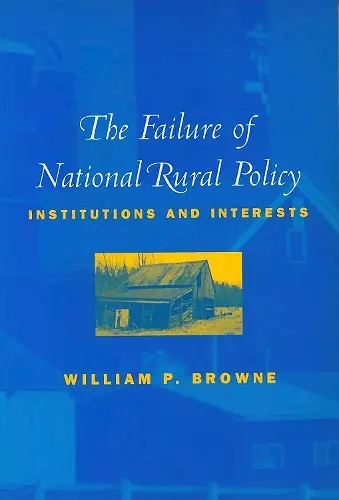The Failure of National Rural Policy
Institutions and Interests
Format:Paperback
Publisher:Georgetown University Press
Published:15th Aug '01
Currently unavailable, our supplier has not provided us a restock date

Another scholarly contribution by a keen observer of U.S. rural life. This thoughtful analysis should be of interest to both public policy academics and practitioners. -- Chuck W. Wiggins, Texas A&M University
Modern farm policy emerged in the United States in 1862, leading to an industrialized agriculture that made the farm sector collectively more successful even as many individual farmers failed. This title blends history, politics, and economics to show that federal government emphasis on farm productivity has failed to meet broader rural needs.Modern farm policy emerged in the United States in 1862, leading to an industrialized agriculture that made the farm sector collectively more successful even as many individual farmers failed. Ever since, a healthy farm economy has been seen as the key to flourishing rural communities, and the problems of rural nonfarmers, former farmers, nonfarm residents, and unfarmed regions were ignored by policymakers. In "The Failure of National Rural Policy", William P. Browne blends history, politics, and economics to show that federal government emphasis on farm productivity has failed to meet broader rural needs and actually has increased rural poverty. He explains how strong public institutions, which developed agrarianism, led to narrowed concepts of the public interest. Reviewing past efforts to expand farm policy benefits to other rural residents, Browne documents the fragmentation of farm policy within the agricultural establishment as farm services grew, the evolution of political turf protection, and the resultant difficulties of rural advocacy. Arguing for an integrated theory of governing institutions and related political interests, he maintains that nonfarm rural society can make a realistic claim for public policy assistance. Written informally, each chapter is followed by comments on the implications of its topics and summaries of key points. This book will serve as a stimulating text for students of public policy, national affairs, rural sociology, and community development - as well as anyone concerned with the future of agrarian America.
Browne's criticisms of analytic knowledge provide a users' perspective on policy research that should be read by all those wishing to engage policymakiers with their analytical findings... The book stands as an important case study of the interaction of interests and institutions in national policymaking and is important reading for the rural policy community. Journal of Regional Science
ISBN: 9780878408580
Dimensions: unknown
Weight: 386g
224 pages